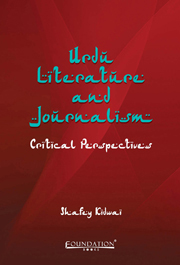Book contents
- Frontmatter
- Dedication
- Contents
- Preface
- Introduction
- Acknowledgements
- 1 Post-Independence Urdu Short Story
- 2 Post-Partition Urdu Poetry
- 3 Structuralism and Post-structuralism in Urdu Criticism
- 4 Jayant Parmar
- 5 Firaq as a Critic
- 6 Ghalib Criticism
- 7 Literature, Culture and Social Consciousness
- 8 The Influence of Tagore on Urdu Literature
- 9 Early Journalistic Endeavours of Sir Syed Ahmad Khan
- 10 Pioneering the First Urdu Book on Journalism
- 11 The Contribution of Urdu Journalists to the First War of Independence
- 12 Abul Kalam Azad's Journalistic Conquests
- Index
Preface
Published online by Cambridge University Press: 05 October 2014
- Frontmatter
- Dedication
- Contents
- Preface
- Introduction
- Acknowledgements
- 1 Post-Independence Urdu Short Story
- 2 Post-Partition Urdu Poetry
- 3 Structuralism and Post-structuralism in Urdu Criticism
- 4 Jayant Parmar
- 5 Firaq as a Critic
- 6 Ghalib Criticism
- 7 Literature, Culture and Social Consciousness
- 8 The Influence of Tagore on Urdu Literature
- 9 Early Journalistic Endeavours of Sir Syed Ahmad Khan
- 10 Pioneering the First Urdu Book on Journalism
- 11 The Contribution of Urdu Journalists to the First War of Independence
- 12 Abul Kalam Azad's Journalistic Conquests
- Index
Summary
Urdu, incorporating the heterogeneous aesthetic sensibilities, pluralistic perceptions, and different literary traditions which represent our age-old cultural and linguistic coalescence and shared social legacy, is certainly more than one of the languages listed in The Eight Schedule of our Constitution. Urdu, despite being derided by some quarters as a language of listless sophistication and mannerism, is essentially a creative accumulation of diverse cultural sentience including the emerging paradigm of subaltern discourse. It will not be an exaggeration to describe Urdu as a way of thinking and a style of life. It is what constitutes the much-admired mosaic of the cultural plurality of India.
Urdu always espouses the cause of unity of humankind, broadmindedness, fellow feeling and magnanimity by deploring the feigned sectarianism. No one can pass over the longstanding tradition of brotherly love unfailingly propagated by Urdu. Creative genius of its widely admired poets such as Meer, Ghalib, Firaq and Faiz was extremely instrumental in making the plural, democratic and liberal Indian society. It is nothing but sheer injustice to equate such an elegant language to a particular religion. Urdu stunningly exemplifies the essence of Indian culture, tolerance and forbearance. Urdu is yet to get its rightful place in its birthplace, and the perpetual neglect of the language hardly goes with the pluralistic culture of the country.
- Type
- Chapter
- Information
- Urdu Literature and JournalismCritical Perspectives, pp. vi - ixPublisher: Foundation BooksPrint publication year: 2014

